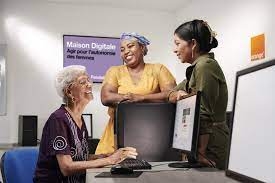Over half of all women worldwide (52%) still don’t use the internet vs 42% of men. Clearly, more and more women have a phone and access to mobile data.
But in developing countries, there are still 313 million fewer women than men that have this access– which is a difference of 23% (source GSMA “Connected Women – The Mobile Gender Gap” 2019).
Today, access to and proficiency in digital skills provides more opportunities in terms of gaining financial independence, escaping poverty, and integrating into society. For the Orange Group, digital technology is a new battleground in the fight for gender equality and women’s emancipation.
Digital education at the core of the Women's Digital Centers
There are innovative solutions enabling women to gain independence from certain social constraints and also play a real role in developing their community: e-administration or e-health services, financial assistance, online lessons.
The Orange Foundation supports women to use digital technology through the Women's Digital Centers: this program aims to train women in digital technology and give them essential knowledge to get to grips with a PC or tablet, use certain software and the internet, and the basics of financial management – to enable them to become economically independent.
In some countries, the Women's Digital Centers support women to find a job, get back to work, or change career. And for other women, this program is a driver to develop their income-generating activities and to create their microbusinesses.
449 Women's Digital Centers are operating in 24 countries in Africa, the Middle East, and Europe and over 60,000 vulnerable women have received training lasting between 6 months and 1 year.
The autonomy of women in Africa starts by giving girls access to school
According to Unicef, only 43 % of girls aged 12 to 18 attend secondary school in developing countries. It's a figure that shocks, but that also encourages us to make every possible effort to provide schooling for girls. It's especially important because educating girls has economic, social and health impacts. The United Nations Population Fund (UNFPA) has shown that a girl who attends school for seven years in a developing country will marry on average four years after the end of her studies. She will have fewer children but they will enjoy better health. In our digital schools, every effort is made to ensure girls can go to school like their brothers. Not just in school but also in their village: a water point is provided to free them from this chore and a healthcare center is there for their family.
